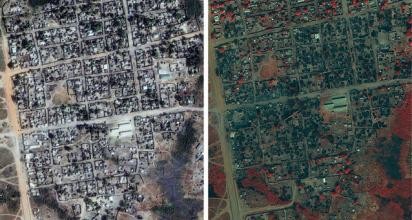The author, a researcher for Human Rights Watch, argues that reports of atrocities in Unity state should prompt the United Nations Security Council and the African Union to enact sanctions on South Sudanese leaders waging war.
In early 2014, just a month after war had broken out between South Sudan’s government and the armed opposition led by Riek Machar, the former vice president, government forces tore their way southward through Unity state, burning villages and displacing thousands of civilians into swamps and other hard-to-reach areas where over the next months they would struggle to survive. Civilians fled for days as one village after another was attacked, and many told us of sexual violence, hunger, and extensive looting by government forces and their allies.
Now Unity state may be seeing a repeat of that horrific violence. Once again government forces are on the march to capture territory from opposition forces, presumably before the rainy season restricts troop movement.
Little information is available about how civilians are faring. The United Nations Mission in South Sudan (UNMISS) released a short statement on May 11 saying they had received reports of villages being burned, rape, and abduction of children. The report echoes concerns of aid workers, many of whom have already been evacuated, leaving hundreds of thousands of civilians without access to lifesaving assistance.
The UN, the African Union (AU), and their member states have repeatedly condemned the warring parties for their abusive conduct and called on the forces to obey the laws of war.
Yet the abuses by both sides have continued, including the use of child soldiers. For example, in Unity state, a government commander, Matthew Pulyang, has forcibly recruited dozens if not hundreds of children over the past year. There is every reason to think that as you read this, yet again child soldiers will be on the frontlines there.
The UN Security Council set up a sanctions regime in February and they should make full use of this now to place travel bans and asset freezes on violators. It should also impose a long overdue arms embargo on both sides.
The UN Security Council should also not just condemn violations but take firm steps to help ensure accountability for the war crimes and potential crimes against humanity UNMISS has already documented in South Sudan.
The AU has threatened sanctions but has not taken steps to impose them, and has yet to take any clear position on ensuring fair, credible prosecutions of serious crimes after shelving the report of its own AU Commission of Inquiry on South Sudan that was meant to recommend a way forward for accountability.
There is no sign that this report will be issued soon, and the UN shouldn’t wait for a new wave of gruesome killings to tackle accountability. Security Council members have already been deliberating on options for justice for South Sudan. Secretary-General Ban-Ki Moon should now take the lead to build support for a well-funded hybrid court with robust participation of international judges and staff, or encourage the Security Council to pass a resolution referring the situation to the International Criminal Court to investigate.
The views expressed in ‘opinion’ articles published by Radio Tamazuj are solely those of the writer. The veracity of any claims made are the responsibility of the author, not Radio Tamazuj.




